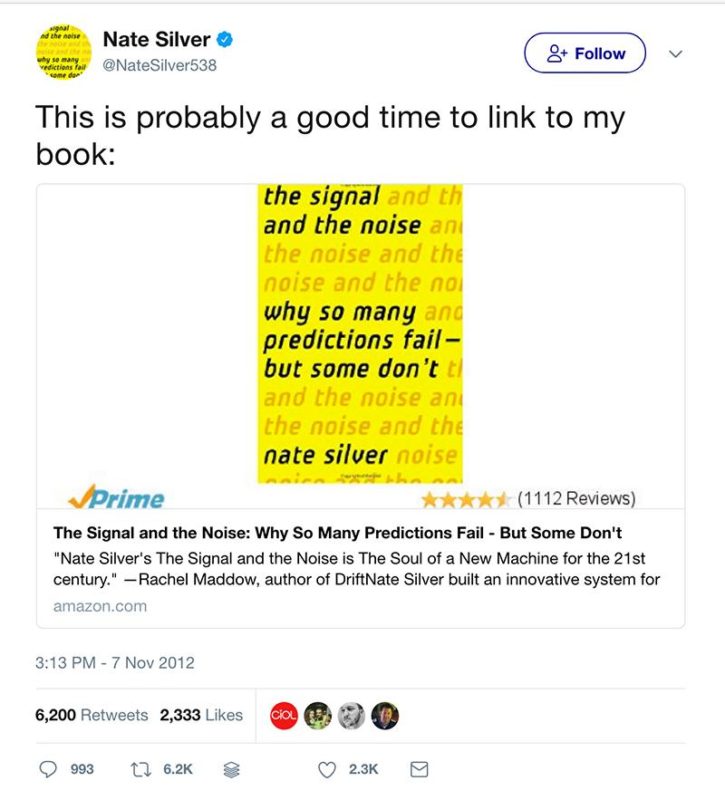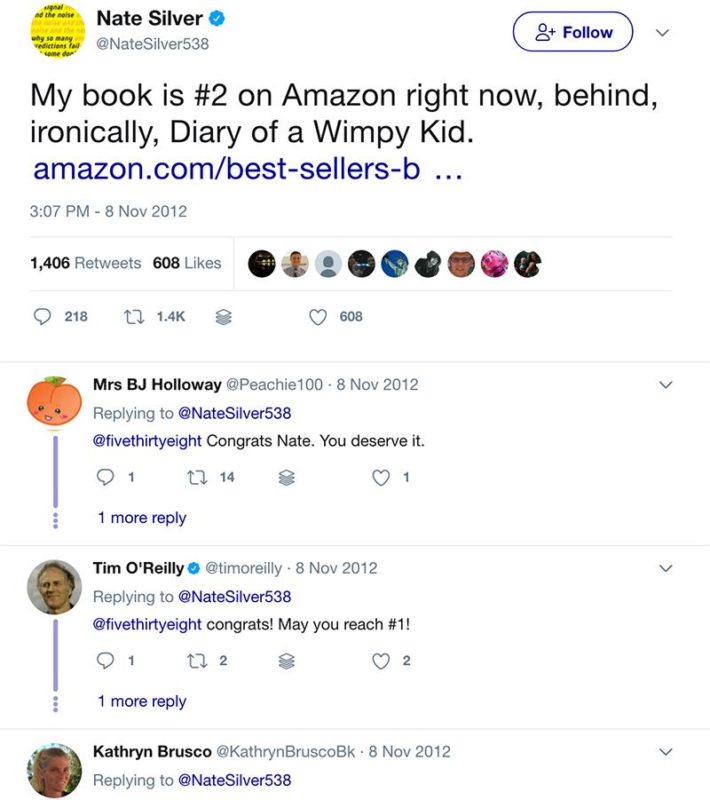Create Niche Content
Episode #3 of the course How to quickly build your online authority by Vinay Koshy
On the election night of 2012, Nate Silver predicted who the winner of the presidential and many congressional elections would be. He also tweeted about his recently published book, The Signal and the Noise: Why So Many Predictions Fail—But Some Don’t.

What people may not know is that before he became a household name, Nate Silver had to compete with hundreds of outlets and so-called experts who claimed they could predict the elections. Many of them offered biased opinions or were just wrong. So, Nate filled the gap. When people need unbiased opinions and data-backed forecasting, Nate Silver became the go-to person.
Nate first gained recognition for his model for baseball performance. He then accurately predicted the 2008 and 2012 presidential elections.
Two days after his tweet promoting his book on election night, it was number two on Amazon and number six on the New York Times bestseller list.

Around election day, 20% of all New York Times traffic included a visit to his blog, FiveThirtyEight.
So, to attain authority status, it’s better to do a deep dive into a handful of topics than to speak generically about everything under the sun.
Go a Mile Deep and an Inch Wide
When you look at authorities in your field, it can be easy to think that their wide-ranging knowledge is key to building authority. However, in the online space, writing content that covers various topics a mile wide and inch deep will fail to be memorable compared with content that is an inch wide and a mile deep.
Consider this: When you think of sites like the Mayo Clinic, All Recipes, or ESPN, you think of them as being authorities in their respective niches—medical, recipes, and sports, respectively.
Without a focus on content around their respective niches, you would not think of them as being authoritative. But it is not just content that creates this impression. Trustworthy, in-depth, and accurate content is what makes the difference.
So, start with a narrow focus for your business and publish in-depth content around it. For example:
• As a social media expert, you might focus on Snapchat only.
• As a interior designer, you could focus on minimalist themes and textures.
Building your online authority is easier when you focus on a specific topic or niche to start with. It is also easier to gain in-depth knowledge, and the search engines will send you more traffic when your site is focused around a narrow topic.
As you grow and cover that topic well, you can then branch out into other topics.
The Search Engine Perspective
It is also important to remember that authoritative content in a niche can also be distinguished by the search engines. According to the Search Engine Journal:
“Google’s human raters and algorithm can distinguish between content written by an amateur and content written by a pro. If you want your content to rank well, it’s got to be professionally written. If you’re looking to win in the content marketing game, don’t mess around with low-quality writers.”
Consider, for example, Jason Acidre, an SEO expert. He says that when he first started blogging, he covered varied topics but then focused on one specific area of SEO: link building. He wrote dozens of guides on how he did it, with the aim of making his blog a preferred destination for link-building guides and tutorials. This then enabled him to sell his ideas on other aspects of inbound marketing.
So, How Do You Niche Down on Content?
Strengthen your brand starting with the quality of content in your niche.
To kick things off, if you already have content on your site, assess the categories where you get the most traction in terms of link acquisitions, social shares, conversions, or sales.
Prioritize your content development efforts on the areas where you can stand out and effectively compete in to gain authority. It is the smart way to stand out and scale when you are in your campaign’s early stages.
Tomorrow, we will look at ways in which we can influence the audience without aiming to influence.
Till then,
Vinay
Recommended book
The Content Trap: A Strategist’s Guide to Digital Change by Bharat Anand
Share with friends

